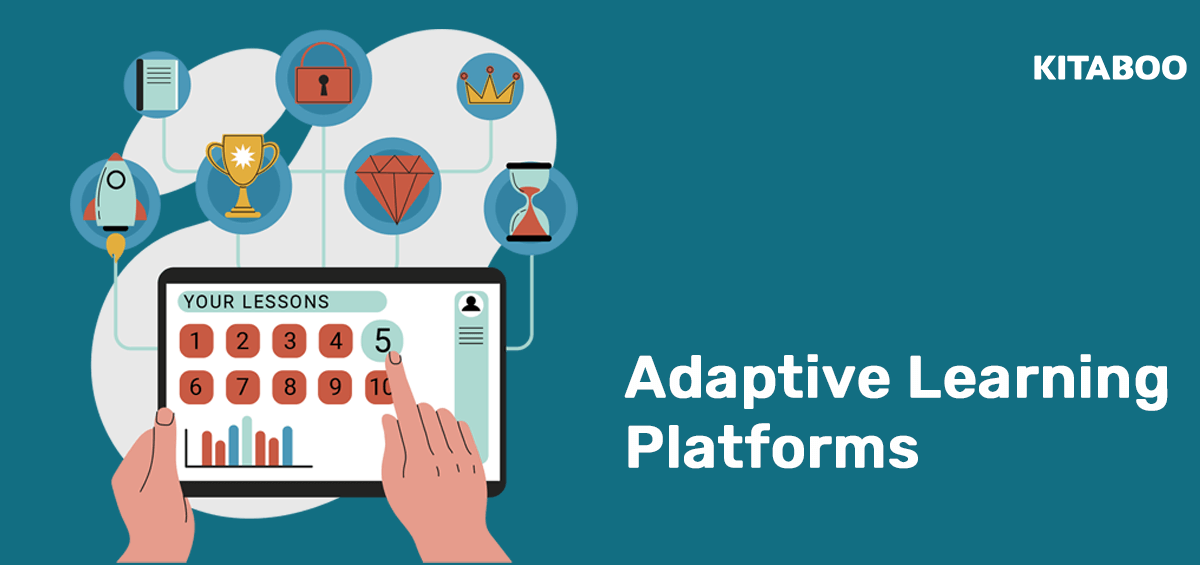With the rise of online education, the demand for dynamic and personalized learning experiences has never been higher. As publishers strive to adapt to these evolving educational landscapes, one technological innovation stands out as a game-changer: adaptive learning platforms.
For prospective publishers, the journey ahead is not just about producing textbooks and educational materials but also about staying ahead of the curve and embracing the tools and technologies that can enhance their offerings.
In this blog, we will explore the exciting world of adaptive learning platforms and shed light on how KITABOO leverages the power of adaptive learning to revolutionize the way publishers create, distribute, and monetize educational content.
Table of Contents
I. The Soaring Demand for Adaptive Learning Platforms and eLearning
II. Top 11 Ways Adaptive Learning Platforms Revolutionize Publishing
- Personalized Content Creation
- Data-Driven Decision Making
- Dynamic Content Delivery
- Global Distribution
- Continuous Monetization
- Improved User Engagement
- Enhanced Content Accessibility
- Rapid Content Updates
- Monetization Flexibility
- Integration with Emerging Technologies
- Real-Time Collaboration Tools
III. Wrapping Up
The Soaring Demand for Adaptive Learning Platforms and eLearning
The demand for adaptive learning platforms and e-learning solutions has witnessed an unprecedented surge in today’s educational landscape. The way we learn and acquire knowledge is evolving rapidly, and the numbers speak for themselves.
According to recent statistics by Spherical Insights, the Global Adaptive Learning Market Size was valued at USD 2.51 Billion in 2021, and it’s projected to skyrocket to a staggering USD 8.63 Billion by 2030, boasting a remarkable CAGR of 22.6%.
These figures clearly underline the immense appetite for adaptive learning solutions, and for good reasons. Let’s understand how publishers can take hold of this golden opportunity and harness the power of adaptive learning platforms through their e-learning solutions.
Top 11 Ways Adaptive Learning Platforms Revolutionize Publishing
In the digital age, education is undergoing a remarkable transformation, and at the heart of the education tech trends are adaptive learning platforms.
These innovative tools have revolutionized how publishers create, distribute, and monetize educational content. Not just that, a market report suggested that the worldwide Adaptive Learning Market is anticipated to achieve a market size of USD 14,114.58 million by the year 2030.
In this section, we will explore the top 11 ways in which adaptive learning platforms are reshaping the world of publishing, creating a more personalized, dynamic, and effective learning experience for students and learners of all ages.
1. Personalized Content Creation
Adaptive learning platforms empower publishers to create highly personalized educational content. Through data-driven insights and algorithms, publishers can tailor content to individual learners’ needs and preferences.
This level of customization ensures that educational materials are engaging and directly address learners’ specific challenges, resulting in improved learning outcomes.
2. Data-Driven Decision Making
Adaptive platforms provide publishers with invaluable data on how learners interact with their content. This data can include progress tracking, assessment results, and engagement metrics.
Publishers can use this information to refine their content, identify areas of improvement, and make data-driven decisions to enhance the overall learning experience.
Also Read: Best eBook Hosting Platforms for Digital Publishing
3. Dynamic Content Delivery
With adaptive learning platforms, publishers can deliver content dynamically, ensuring that learners receive the right material at the right time.
As students progress, the platform adapts by providing more challenging content or additional support, creating an individualized learning path that maximizes comprehension and retention.
4. Global Distribution
The digital nature of adaptive learning platforms allows publishers to reach a global audience effortlessly.
Without the limitations of physical distribution, publishers can expand their market reach and provide educational content to learners worldwide. This global accessibility opens up new revenue streams and opportunities for publishers.
5. Continuous Monetization
Adaptive platforms support ongoing monetization strategies. Publishers can offer subscription-based access to their adaptive content, creating a steady stream of revenue.
Additionally, they can sell supplementary materials, such as practice assessments or interactive simulations, enhancing their product offerings and increasing monetization potential.
6. Improved User Engagement
Adaptive learning platforms are designed with user engagement in mind. Interactive features, gamification elements, and real-time feedback mechanisms keep learners motivated and actively engaged with the content.
Publishers can leverage these features to attract and retain users, ultimately increasing the perceived value of their educational materials.
7. Enhanced Content Accessibility
Adaptive learning platforms enable publishers to make educational content more accessible to diverse learners.
They can incorporate features like text-to-speech, translations, and adjustable font sizes, ensuring that their materials are inclusive and accommodating to individuals with various learning styles, abilities, and language preferences.
8. Rapid Content Updates
In the fast-paced world of education, information evolves constantly. Adaptive platforms make it easier for publishers to keep their content up-to-date.
They can swiftly integrate new research findings, industry developments, or curriculum changes, ensuring that learners always have access to the most current and relevant information.
Monetization-Flexibility
Adaptive learning platforms offer publishers a range of monetization options beyond traditional sales. They can explore partnerships with educational institutions, offering bulk licenses for schools and universities.
Furthermore, publishers can leverage freemium models, allowing users to access basic content for free while offering premium, value-added features for a fee.
10. Integration with Emerging Technologies
Adaptive learning platforms can easily integrate with emerging technologies such as virtual reality (VR), augmented reality (AR), and artificial intelligence (AI).
Publishers can leverage these technologies to create immersive and interactive learning experiences that captivate learners and deliver content in innovative ways, setting their materials apart in the competitive educational market.
11. Real-Time Collaboration Tools
Adaptive learning platforms often integrate collaborative features such as discussion boards, chat functions, and collaborative projects. These tools enable publishers to create interactive learning communities within their platforms, fostering engagement and knowledge-sharing among learners.
Publishers can facilitate group discussions, peer reviews, and collaborative projects, enhancing the overall educational experience.
Wrapping Up
In essence, adaptive learning platforms are revolutionizing the way publishers create, distribute, and monetize educational content by putting the learner at the center of the educational experience.
These platforms harness the power of data and personalization to enhance the effectiveness of educational materials, expand market reach, and create sustainable revenue streams. As the educational landscape continues to evolve, publishers who embrace adaptive learning technology will definitely thrive in this ever-changing industry.
Unlock the Future of ePublishing with KITABOO!
Discover the revolutionary world of digital publishing with KITABOO – the digital textbook platform. Our cutting-edge platform empowers publishers like never before, offering dynamic content creation, seamless distribution, and unparalleled monetization opportunities.
Join the ranks of forward-thinking publishers who are transforming education and knowledge sharing with KITABOO. Embrace the future of publishing today – Request a Demo to get started on a journey of innovation and success!
Suggested Reads:
Discover How An Ebook Conversion, Publishing & Distribution Platform Can Help You
Kitaboo is a cloud-based content platform to create-publish & securely distribute interactive mobile-ready ebooks.
You May Also Like
-
KITABOO: Revolutionizing Digital Reading Experiences!
Blog,Digital Publishing,eBook solution / February 18, 2024








